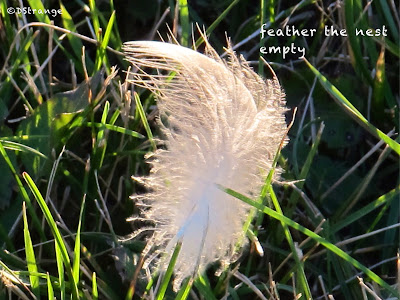Tanka Section
tracks of birds
meander through snow . . .
the surgeon
marks her left breast
with a cross
1st Place
Judge's comments:
The winning entry stood out to me immediately. The use of strong, fresh images successfully creates both contrast and impact, while leaving enough space for the reader to fill in. I have read this tanka over and over again, and still, it has not lost its appeal. The strength lies in the juxtaposition between different types of marks...I felt myself drawn in, wishing to further explore the man-made nature of the cross left by the surgeon, in relation to the 'tracks of birds' in snow. The effect is striking, dramatic even. The reader is further invited to explore the silences between the five lines, and to follow the meandering not just of bird tracks, but also of thoughts. Skilfully, the poet provides a window for the reader to look through, placing us right there, as humans, at our most vulnerable. Written in the third person, the tanka ingeniously builds on the idea of looking in from the outside. It could be that the writer is someone close to the person about to undergo surgery, or perhaps, a way to detach oneself from a difficult event. Either way, the effect is powerful, as we are welcomed to both observe and fill in the blanks with our own experiences, recollecting those crosses and events that have marked and shaped us. Executed with precision this tanka is succinct and cutting, yet at the same time elegant, lyrical and evocative.
—Caroline Skanne
impossible
to hold the light
of mercury . . .
your memory
slips away
Runner-up
Judge's comments:
The runner-up tanka by Debbie Strange (Canada) was a strong contender for many similar reasons. It employed solid construction, rhythmical language, original metaphor, and vast amounts of dreaming room...Again, we have a tanka that says much in just 19 syllables held inside 11 words. How adept the lines:
impossible
to hold the light
of mercury
Anyone who has broken a thermometer containing quicksilver will know it is slippery and virtually impossible to corral and clean up. And the mirrored surface of liquid mercury means that, as it travels around, the light moves with it. But is the poet only referring to chemical mercury? Or is there a planetary or classical god reference here as well? Mercury, the planet, is the closest to our sun, and is the fastest moving of all the planets. The Roman god Mercury also travelled quickly from place to place.
And despite humans being creatures of habit, and wanting to hold on to what is good and pleasing to us, sometimes things slip through our fingers too quickly like, well, mercury. And one of those things that often slip away from us before we are ready is memory:
your memory
slips away
There is also a dual interpretation of these last two lines. Is this the tanka subject's memory failing? Or is it perhaps the narrator's memory of someone fading over time? It is this dreaming room that makes quality tanka such as this so very engaging to the reader.
This again is an original take on memory and memory loss by teaming it with a fast-moving object, such as mercury. The opposition employed is also ingenious. Memory is starting to fade and tarnish next to the gleaming silver and light of mercury. The poet is showing us, with an insightful metaphor, that memory and mercury can both be elusive, and sometimes our hold on either of them is beyond our control. Could it also be that this person losing their memory also once had a brilliant 'quicksilver mind'?
We again enjoy the subtle poetic device of alliteration with the pleasing 'm' and 'p' sounds contained in the chosen language of this tanka. I feel this tanka poet also understands the importance of tanka being pleasing to the ear when read aloud.
—David Terelinck
Haiku Section
harsh winter
squirrels gnaw the tines
of shed antlers
Special Mention
—David Jacobs, Judge























